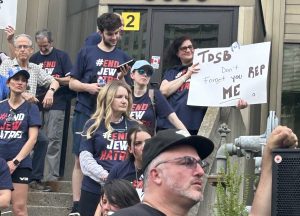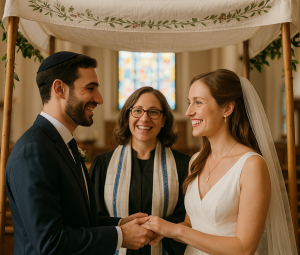 TORONTO — Israel has to change the way it treats its Arab citizens and the haredim, allocating resources more equitably to the former and having the latter “go back to work,” Knesset member Avishay Braverman, Israel’s minister of minority affairs, said at the opening evening plenary of the Reform Judaism’s (URJ) 70th biennial convention last week. (with video)
TORONTO — Israel has to change the way it treats its Arab citizens and the haredim, allocating resources more equitably to the former and having the latter “go back to work,” Knesset member Avishay Braverman, Israel’s minister of minority affairs, said at the opening evening plenary of the Reform Judaism’s (URJ) 70th biennial convention last week. (with video)
Michael Oren and Rabbi Eric Yoffie [David Collin photo]
Embracing Israeli Arabs is not only moral, it’s wise, Braverman stressed. If not, he said, they’ll become fundamentalist at some point.
About 3,500 delegates from the United States, Canada and eight other countries filled the Metro Toronto Convention Centre Nov. 4 to 8 to hear Braverman and other prominent speakers, and to learn, pray, sing, study and shmooze. It was the first time in 30 years the convention has been held in Canada. It also took place in Toronto in 1979.
Braverman’s comments tied in with a biennial resolution encouraging Israel’s efforts to address inequality among Israel’s Jewish and Arab citizens.
It was the first time the Reform movement’s major body passed a measure specifically addressing the needs of the minority population. The resolution notes that 50 per cent of Israeli Arabs live below the poverty line and receive only 71 per cent of the education resources due them.
Other resolutions called for supporting Jewish camping for children with special needs and affirming the Reform day school movement.
“The only way for Israel to survive in the long term is to be a strong, just, Jewish democracy,” Braverman said.
“In order to have a future for our grandchildren, we have to act boldly toward [dividing] the Holy Land, because we have to have a Jewish majority, and it has to be now.”
With respect to Israel’s haredi population, Braverman noted that David Ben-Gurion, Israel’s first prime minister, “agreed that a couple of hundred ultra-Orthodox scholars would be subsidized, but he didn’t expect such exponential growth.”
Although the mood at the convention was upbeat, with the buzz of participants reconnecting and music from a total of some two dozen performers over the five days, URJ president Rabbi Eric Yoffie sounded a sobering note at the opening plenary when he talked about the recent economic crisis, “unprecedented since the Great Depression.”
Much of the conference would be spent sharing related experiences and ideas, he said.
“It has been very difficult and painful, but we have made the changes needed to keep our synagogues strong,” Rabbi Yoffie said.
As part of a recession-driven restructuring, the URJ – the congregational umbrella for the Reform movement with more than 900 affiliated synagogues in North America, including 26 in Canada – eliminated 60 full-time-equivalent positions in North America in January, and the Toronto office of the Canadian Council for Reform Judaism was closed May 31. It was one of 14 regional URJ offices to be dismantled.
The “building blocks” of URJ – including summer camps, Israel programs, and North American Federation of Temple Youth – remain the same, Rabbi Yoffie said.
The biennial offered a varied program with an array of high-profile speakers including Tony Blair, former prime minister of the United Kingdom, and King Abdullah of Jordan, both of whom spoke via video feed; Dr. Ruth Westheimer, who discussed “Sex in the Jewish Tradition” at a Shabbat luncheon; Miriam Ziv and Michael Oren, Israel’s ambassadors to Canada and the United States respectively; and Anita Diamant, author of The Red Tent.
Torah scholar Aviva Zornberg, philanthropist and Jewish camping advocate Harold Grinspoon, and human rights activist Irwin Cotler, MP, a former Justice Minister of Canada, also spoke at the conference, and received awards from the URJ.
As well, at the Women of Reform Judaism 47th assembly, which was held concurrently, Torontonian Judy Feld Carr received the Dr. Jane Evans Pursuit of Justice Award for having freed more than 3,000 Jews from Syria. Speakers, along with Feld Carr, included Izzeldin Abuelaish, the Palestinian doctor and peace proponent who lost three daughters and a niece when an Israeli tank shell shattered his Jabalia refugee camp home.
Topics at breakout learning sessions included Shabbat, “forgotten” congregants, intermarriage, young families, prayer, politics and temple budgets. There was an overall emphasis on environmental initiatives – which was also the subject of a resolution – and tikkun olam, particularly Nothing But Nets, the URJ’s anti-malaria initiative to purchase bed nets for families in Africa.
Grade 8 students from Toronto’s Leo Baeck Day School introduced a tzedakah project called Toonies for Togetherness to help fund a joint Jewish/Arab school that the Reform movement in Israel is running.
Like Ziv, who spoke before him, Braverman stressed the importance of countering Iran’s nuclear threat. “We have to increase the pressure worldwide on Iran, so that Iran doesn’t become a threat not only to us, but to the entire world,” Braverman said.
He also emphasized the importance of Israel’s having both military and economic strength.
During his presidential sermon, Rabbi Yoffie urged Reform Jews to consider the ethical, environmental and health aspects of what they eat, and come up with food policies for their synagogues.
He said that cutting down on red meat “is an area where we can make a difference” in offsetting our carbon footprint.
Synagogues might also consider serving more communal meals, he suggested, as a way of building spiritual community. He also encouraged the planting of synagogue gardens.
To help Reform Jews take these practical steps, the union has posted a food policy guide, sample curriculum for youth groups, gardening tips and information on how synagogues can set up Community Supported Agriculture programs.
In his sermon, Yoffie also urged Reform congregations to harness the community-building power of the Internet and set up their own blogs.
Diamant outlined her take on Judaism today – which she calls “Minhag America,” borrowing the title of Rabbi Isaac Meyer Wise’s 1856 siddur – and said that one of its cornerstones is the full participation of women. She was referring not only to women’s participation on the bimah but also in public discourse, as evidenced by her speech.
“There has never been a better time to be Jewish,” Diamant said. “We find ourselves in a time bursting with ideas and possibilities.”
A generation ago, “the idea that someone like me – a Reform Jew and a feminist – would found a mikvah [Boston’s five-year-old Mayyim Hayyim], would cause heads to explode.”
Diamant’s ideas for the Reform movement include setting up storefront learning centres and “get[ting] our Chabad on” by assigning charismatic young rabbis “to see what they can get going.”
“Ancient roots are no more authentic than new growth,” she said. “Both are crucial. Both are serious.”
At Thursday morning’s plenary – a joint session with the Women of Reform Judaism – Michael Oren, Israeli ambassador to the United States, said there are ways to allay doubts of those who condemn Israel, including “some of our own Jewish youth.
“We remind our listeners of the multiple times in history where Zionist and Israeli leaders accepted a two-state solution only to have those offers rejected,” he said.
“We recognize the existence of a Palestinian people with relation to a state and a land that they regard as their homeland, but we are hard-pressed to find Palestinians who say the same thing about us.”
As well, he added, “we recall the instances in which Israeli withdrawals were met with rockets.”
Drawing on his own experiences as a soldier, he said that Israel, by warning civilians of imminent attacks, were “sacrificing the element of surprise and risking the lives of our own soldiers.”
Oren – who lost a sister-in-law in a suicide bombing and whose eldest son was wounded in battle – said Israel’s actions equal “that of the world’s most enlightened countries.
“We do have some shortcomings, but they should never impugn our right to exist as a free and secure nation.”
Israel is facing a fundamental threat from “the unconventional weapon of deligitimization,” Oren said. “It opens the door to economic sanctions, arrest of leaders for war crimes, and isolation as a pariah state.
Israel can and will defend itself, he stressed. “Ultimately, Israel’s ability to withstand the onslaught of deligitimization depends on unity among the Jewish people.
“Jews of Israel, as Jews everywhere, have the right to defend themselves, the right to survive as Jews.”
Former British prime minister Tony Blair, speaking live on a video feed from Yale University, said that in his experience, “religion matters. It motivates and galvanizes vast numbers of people in the world.
“How do we make it a force for good rather than conflict?” he asked.
He believes that will only happens “if part of our attitude as people of faith is an openness to those of a different faith.”
In a question-and-answer session with Rabbi David Saperstein, director of the Washington, D.C.-based Religious Action Center of Reform Judaism, Blair said that real faith can give political leaders the strength to do what they think is right, and the humility to recognize that they may be wrong.
Blair said one of the things he likes about America is that “when people get up for the national anthem, it’s a statement that there is a certain space in which we come together and the values we have in that space are not negotiable.”
At the closing plenary session, King Abdullah II of Jordan addressed the delegates by video, thanking them for giving him the opportunity to talk about multifaith dialogue.
“Every generation in history has faced the danger of interfaith division. In our time, we [have to] share the responsibility for peace,” he said.
He called for a two-state solution that addresses the rights of Palestinians and Israelis. “We must act to put an end to the conflict in Israel. We must put [it] behind us so we can focus on what brings us together. We need to move forward to a genuine peace, and to live in harmony.”
He praised the Union of Reform Judaism for promoting interfaith dialogue, and for reaching out to the Muslim community. “Together, we can make a difference,” he said.
With files from Carolyn Blackman and JTA.









